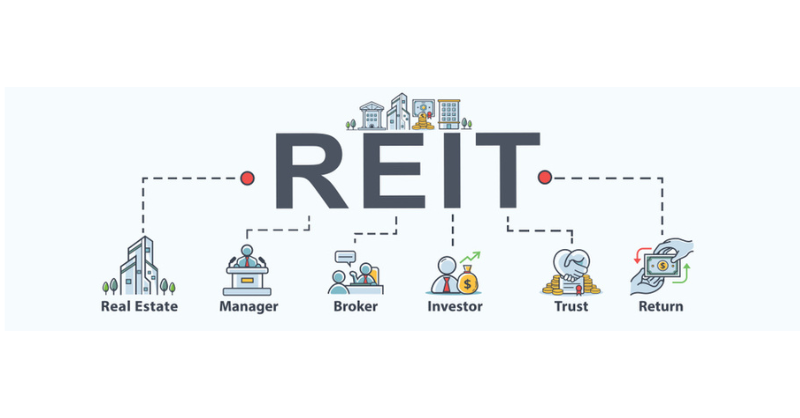A real estate investment trust (REIT) is a company which owns and manages income-producing real estate assets. They allow investors to pool their money and invest in a diversified portfolio of properties. REITs pay at least 90% of their taxable income to shareholders as dividends. In addition, REITs generate income from rent, leasing, and sale of properties.
Is real estate investment trusts a good career path? It depends on individual interests and skills.
How does a real estate investment trust work?
A real estate investment trust (REIT) are companies that own and manages income-producing real estate properties. For example, apartment buildings, office buildings, shopping centres, hotels, and warehouses. REITs allow investors to invest in a diversified portfolio of real estate assets without having to purchase and manage properties themselves.
REITs are required by law to distribute at least 90% of their taxable income to their shareholders in the form of dividends. As a result, they offer investors a steady income stream in the form of dividends, typically paid out quarterly.
REITs can be traded publicly on major stock exchanges, or they can be privately held. Publicly traded REITs are traded like other stocks, while private REITs are only available to accredited investors.
Investors can buy and sell a REIT’s shares like with any other publicly traded company. However, when a REIT earns rental income from its properties, it pays operating expenses. Such as property taxes, maintenance, and mortgage payments. Then it distributes the remaining income to its shareholders as dividends.
One of the benefits of investing in a REIT is that it allows investors to gain exposure to the real estate market with relatively low investment amounts. Additionally, because REITs are required to distribute most of their income as dividends, they can provide investors with a steady source of income that may be more attractive than other investments that do not pay dividends. However, it is important to note that REITs are subjected to market fluctuations and other risks, and as with any investment, it is important to conduct thorough research before investing.
What are the benefits of investing in real estate trust?

Investing in a real estate investment trust (REIT) can offer several benefits, including:
Diversification
REITs allow investors to diversify their investment portfolios with exposure to the real estate sector. By investing in a REIT, an investor can own a fractional share of a diverse portfolio of real estate properties, which can help reduce the risk associated with owning individual properties.
Access to professional management
Professional real estate managers with experience in acquiring, managing, and disposing of properties manage REITs. By investing in a REIT, investors can benefit from the expertise of these managers without having to manage properties themselves.
Passive income
At least 90% of taxable income is required by law to distribute to shareholders as dividends. This means that investors can earn regular passive income from their investment in a REIT.
Liquidity
REITs can be traded publicly on major stock exchanges, which means that investors can easily buy and sell shares of a REIT like they would with any other publicly traded company.
Tax advantages
REITs are structured as pass-through entities, they do not pay federal income tax at the corporate level. Instead, the income earned by the REIT is passed through to shareholders, who pay taxes on the income they receive. Additionally, REITs can provide investors with tax-advantaged dividend income, which benefits those seeking to minimise their tax liabilities.
Potential for capital appreciation
While the primary focus of a REIT is income generation, there is also the potential for capital appreciation as the value of the properties in the REIT’s portfolio increases over time.
Overall, investing in a REIT can provide investors with exposure to the real estate market, passive income, professional management, and potential tax advantages, making attractive investment options for many investors. However, as with any investment, conducting thorough research and understanding the risks associated with investing in a REIT is important.
Is Real Estate Investment Trusts a Good Career Path?
A career in Real Estate Investment Trusts (REITs) is a good path depending on individual preferences, skills, and career goals. However, REITs can be an excellent career path for those interested in real estate, finance, and investment management. And also those seeking high-earning potential and stability in the industry.
REITs offer diverse career paths, including roles in finance, operations, asset management, and more. The industry also provides opportunities for professional growth and development, with many organisations offering training, mentorship, and leadership programs.
However, as with any career, there are potential challenges and drawbacks. These can include a competitive job market the industry’s cyclical nature, regulatory and compliance requirements, and a high-pressure work environment.
Overall, a career in REITs can be a good choice for those who possess the required skills and qualifications and are passionate about real estate and finance. However, those considering a career in REITs should carefully weigh the potential benefits. And challenges to determine if it is the right path for them.
If you are interested in real estate investment and want more information on is real estate investment trusts a good career path, enrol on Real Estate Investment Training.
Advantages of pursuing a career in REITs

Is real estate investment trusts a good career path? Lets us look at the advantages of pursuing a career in real estate investment trusts (REITs)
Job growth and stability
The REIT industry has experienced significant growth in recent years, which is expected to continue. As a result, there are many industry job opportunities, from entry-level positions to executive roles. Additionally, REITs are generally considered stable investments, which means that jobs in the industry may offer more stability than in other sectors.
Diverse career paths
The REIT industry encompasses many real estate sectors, including residential, commercial, and industrial properties. This diversity means that there are many career paths to choose from, including roles in acquisitions, asset management, leasing, development, and finance.
Competitive compensation
The compensation packages for professionals in the REIT industry can be quite competitive, with salaries and bonuses often exceeding those in other sectors.
Professional development opportunities
REITs are typically large, publicly traded companies that invest heavily in employee professional development. This can include training programs, mentoring, and opportunities for advancement.
Impactful work
Real estate is a critical component of the economy, and REITs play an important role in providing people with places to live, work, and shop. In addition, working in the industry can be rewarding because of the tangible impact that real estate development can have on communities.
Overall, pursuing a career in REITs can offer a range of benefits, including job growth and stability, diverse career paths, competitive compensation, professional development opportunities, and the opportunity to make a meaningful impact on communities.
Skills and qualifications required for a career in REITs

Here are some more skills and qualifications required for a career in REITs:
Knowledge of finance and accounting principles
Many roles within the REIT industry require a strong understanding of finance and accounting principles, as REITs are heavily focused on financial performance and metrics. As a result, professionals in the industry should be comfortable working with financial statements, performing financial analyses, and managing budgets and forecasts.
Strong analytical and problem-solving skills
Analytical and problem-solving skills are important in many roles within the REIT industry. Professionals should be able to analyse market trends, property performance, and financial data to make strategic decisions and solve complex problems.
Effective communication and negotiation skills
Effective communication and negotiation skills are critical in many roles within the REIT industry. Professionals must communicate effectively with colleagues, investors, and other stakeholders and should be able to negotiate effectively in deal-making situations.
Understanding of market trends and industry regulations
REIT professionals should have a strong understanding of market trends and industry regulations that impact the industry. This can include knowledge of real estate law, tax regulations, and zoning laws, among others.
Experience in real estate, finance and related fields
Many roles within the REIT industry require experience in real estate, finance, or related fields. For example, professionals with experience in property management, leasing, acquisitions, or finance may be well-suited for roles in the industry.
Overall, a career in REITs requires a combination of financial, analytical, communication, and industry-specific skills and knowledge. Professionals with a strong background in finance, real estate, or related fields, who possess these skills, are well-positioned to succeed in the industry. Find out is real estate investment trusts are a good career path through the Real Estate Investment Training course.
Potential challenges and drawbacks of a career in REITs
Here are some more potential challenges and drawbacks of a career in REITs:
Competitive job market
The REIT industry can be highly competitive, particularly for entry-level positions. In addition, there may be a limited number of jobs compared to the number of qualified candidates, making it challenging to break into the industry.
Cyclical nature of the industry
The REIT industry can be sensitive to changes in the economy and real estate market. Economic downturns and fluctuations in the real estate market can impact the industry’s financial performance, leading to layoffs or other challenges for professionals working in the industry.
Regulatory and compliance requirements
The REIT industry is subject to a range of regulations and compliance requirements, which can be complex and time-consuming. Therefore, professionals in the industry must stay up-to-date on changing regulations and ensure that their work adheres to all relevant requirements.
High-pressure work environment
The fast-paced nature of the industry, as well as the high-stakes nature of real estate deals, can create a high-pressure work environment for professionals working in REITs. This can lead to stress, long work hours, and a need to meet strict deadlines.
Overall, a career in REITs can come with its challenges and drawbacks. However, for those who are well-prepared and able to navigate these challenges, a career in REITs can offer many opportunities for professional growth, financial success, and community impact.
FAQs
1. Is real estate investment trusts a good career path for someone interested in finance?
Real estate investment trusts (REITs) can be a great career path for someone interested in finance as they provide exposure to the real estate market while utilising financial analysis and management skills.
2. Is real estate investment trusts a good career path for someone who enjoys working with numbers?
Yes, REITs involve working with financial data, market trends, and property valuations, making it a suitable career path for individuals who enjoy working with numbers.
3. Is real estate investment trusts a good career path for someone who wants to make a difference in the community?
REITs offer an opportunity for individuals to make a difference in their communities by investing in and developing properties that can benefit the local economy.
4. Is real estate investment trusts a good career path for someone who wants to work in the real estate industry but not as a real estate agent?
Absolutely, working in REITs is an excellent career path for those interested in real estate but not interested in becoming a real estate agent.
5. Is real estate investment trusts a good career path for someone who wants to have a flexible work schedule?
REITs offer a degree of flexibility, particularly for those working in financial analysis or management roles, making it a good career path for individuals looking for a flexible work schedule.
6. Is real estate investment trusts a good career path for someone who wants to have a good work-life balance?
REITs can offer a good work-life balance, with many companies providing flexible work arrangements. And opportunities for remote work.
7. Are real estate investment trusts good?
REITs offer a promising career path in real estate. They provide stable income and growth potential, along with diversification and liquidity compared to physical properties.







 March 14, 2024
March 14, 2024






